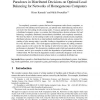Free Online Productivity Tools
i2Speak
i2Symbol
i2OCR
iTex2Img
iWeb2Print
iWeb2Shot
i2Type
iPdf2Split
iPdf2Merge
i2Bopomofo
i2Arabic
i2Style
i2Image
i2PDF
iLatex2Rtf
Sci2ools
JACM
2002
2002
Paradoxes in distributed decisions on optimal load balancing for networks of homogeneous computers
In completely symmetric systems that have homogeneous nodes (hosts, computers, or processors) with identical arrival processes, an optimal static load balancing scheme does not involve the forwarding of jobs among nodes. Using an appropriate analytic model of a distributed computer system, we examine the following three decision schemes for load balancing: completely distributed, intermediately distributed, and completely centralized. We show that there is no forwarding of jobs in the completely centralized and completely distributed schemes, but that in an intermediately distributed decision scheme, mutual forwarding of jobs among nodes is possible, leading to degradation in system performance for every decision maker. This result appears paradoxical, because by adding communication capacity to the system for the sharing of jobs between nodes, the overall system performance is degraded. We characterize conditions under which such paradoxical behavior occurs, and we give examples in w...
Related Content
| Added | 22 Dec 2010 |
| Updated | 22 Dec 2010 |
| Type | Journal |
| Year | 2002 |
| Where | JACM |
| Authors | Hisao Kameda, Odile Pourtallier |
Comments (0)

